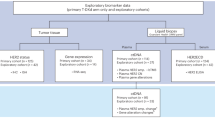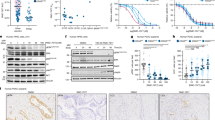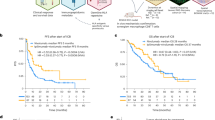Abstract
Background
Gut microbiome modulation to boost antitumor immune responses is under investigation.
Methods
ROMA-2 evaluated the microbial ecosystem therapeutic (MET)-4 oral consortia, a mixture of cultured human stool-derived immune-responsiveness associated bacteria, given with chemoradiation (CRT) in HPV-related oropharyngeal cancer patients. Co-primary endpoints were safety and changes in stool cumulative MET-4 taxa relative abundance (RA) by 16SRNA sequencing. Stools and plasma were collected pre/post-MET-4 intervention for microbiome and metabolome analysis.
Results
Twenty-nine patients received ≥1 dose of MET-4 and were evaluable for safety: drug-related adverse events (AEs) occurred in 13/29 patients: all grade 1–2 except one grade 3 (diarrhea). MET-4 was discontinued early in 7/29 patients due to CRT-induced toxicity, and in 1/29 due to MET-4 AEs. Twenty patients were evaluable for ecological endpoints: there was no increase in stool MET-4 RA post-intervention but trended to increase in stage III patients (p = 0.06). MET-4 RA was higher in stage III vs I-II patients at week 4 (p = 0.03) and 2-month follow-up (p = 0.01), which correlated with changes in plasma and stool targeted metabolomics.
Conclusions
ROMA-2 did not meet its primary ecologic endpoint, as no engraftment was observed in the overall cohort. Exploratory findings of engraftment in stage III patients warrants further investigation of microbiome interventions in this subgroup.
This is a preview of subscription content, access via your institution
Access options
Subscribe to this journal
Receive 24 print issues and online access
$259.00 per year
only $10.79 per issue
Buy this article
- Purchase on Springer Link
- Instant access to full article PDF
Prices may be subject to local taxes which are calculated during checkout



Similar content being viewed by others
Data availability
The datasets generated and analyzed during the current study will be made available in public repository. OTU tables are provided in the Supplementary Material.
References
Routy B, Le Chatelier E, Derosa L, Duong CPM, Alou MT, Daillere R, et al. Gut microbiome influences efficacy of PD-1-based immunotherapy against epithelial tumors. Science. 2018;359:91–7.
Gopalakrishnan V, Spencer CN, Nezi L, Reuben A, Andrews MC, Karpinets TV, et al. Gut microbiome modulates response to anti-PD-1 immunotherapy in melanoma patients. Science. 2018;359:97–103.
Davar D, Dzutsev AK, McCulloch JA, Rodrigues RR, Chauvin JM, Morrison RM, et al. Fecal microbiota transplant overcomes resistance to anti-PD-1 therapy in melanoma patients. Science. 2021;371:595–602.
Baruch EN, Youngster I, Ben-Betzalel G, Ortenberg R, Lahat A, Katz L, et al. Fecal microbiota transplant promotes response in immunotherapy-refractory melanoma patients. Science. 2021;371:602–9.
Marcella C, Cui B, Kelly CR, Ianiro G, Cammarota G, Zhang F. Systematic review: the global incidence of faecal microbiota transplantation-related adverse events from 2000 to 2020. Aliment Pharm Ther. 2021;53:33–42.
Araujo DV, Watson GA, Oliva M, Heirali A, Coburn B, Spreafico A, et al. Bugs as drugs: the role of microbiome in cancer focusing on immunotherapeutics. Cancer Treat Rev. 2020;92:102125.
Louie T, Golan Y, Khanna S, Bobilev D, Erpelding N, Fratazzi C, et al. VE303, a defined bacterial consortium, for prevention of recurrent clostridioides difficile infection: a randomized clinical trial. JAMA. 2023;329:1356–66.
van der Lelie D, Oka A, Taghavi S, Umeno J, Fan TJ, Merrell KE, et al. Rationally designed bacterial consortia to treat chronic immune-mediated colitis and restore intestinal homeostasis. Nat Commun. 2021;12:3105.
Spreafico A, Heirali AA, Araujo DV, Tan TJ, Oliva M, Schneeberger PHH, et al. First-in-class microbial ecosystem therapeutic 4 (MET4) in combination with immune checkpoint inhibitors in patients with advanced solid tumors (MET4-IO trial). Ann Oncol. 2023;34:520–30.
Oliva M, Spreafico A, Taberna M, Alemany L, Coburn B, Mesia R, et al. Immune biomarkers of response to immune-checkpoint inhibitors in head and neck squamous cell carcinoma. Ann Oncol. 2019;30:57–67.
Orlandi E, Iacovelli NA, Tombolini V, Rancati T, Polimeni A, De Cecco L, et al. Potential role of microbiome in oncogenesis, outcome prediction and therapeutic targeting for head and neck cancer. Oral Oncol. 2019;99:104453.
Oliva M, Schneeberger PHH, Rey V, Cho M, Taylor R, Hansen AR. Transitions in oral and gut microbiome of HPV+ oropharyngeal squamous cell carcinoma following definitive chemoradiotherapy (ROMA LA-OPSCC study). Br J Cancer. 2021;124:1543–1551.
Oliva Bernal M, Schneeberger PHH, Taylor R, Rey V, Hansen AR, Taylor K, et al. Role of the oral and gut microbiota as a biomarker in locoregionally advanced oropharyngeal squamous cell carcinoma (ROMA LA-OPSCC). J Clin Oncol. 2019;37:6045.
Wong KCW, Johnson D, Hui EP, Lam RCT, Ma BBY, Chan ATC. Opportunities and challenges in combining immunotherapy and radiotherapy in head and neck cancers. Cancer Treat Rev. 2022;105:102361.
Callahan BJ, McMurdie PJ, Rosen MJ, Han AW, Johnson AJ, Holmes SP. DADA2: High-resolution sample inference from Illumina amplicon data. Nat Methods. 2016;13:581–3.
Bolyen E, Rideout JR, Dillon MR, Bokulich NA, Abnet CC, Al-Ghalith GA, et al. Reproducible, interactive, scalable and extensible microbiome data science using QIIME 2. Nat Biotechnol. 2019;37:852–7.
Spencer CN, McQuade JL, Gopalakrishnan V, McCulloch JA, Vetizou M, Cogdill AP, et al. Dietary fiber and probiotics influence the gut microbiome and melanoma immunotherapy response. Science. 2021;374:1632–40.
Dizman N, Meza L, Bergerot P, Alcantara M, Dorff T, Lyou Y, et al. Nivolumab plus ipilimumab with or without live bacterial supplementation in metastatic renal cell carcinoma: a randomized phase 1 trial. Nat Med. 2022;28:704–12.
Eng L, Sutradhar R, Niu Y, Liu N, Liu Y, Kaliwal Y, et al. Impact of antibiotic exposure before immune checkpoint inhibitor treatment on overall survival in older adults with cancer: a population-based study. J Clin Oncol. 2023;41:3122–34.
Huang C, Feng S, Huo F, Liu H. Effects of four antibiotics on the diversity of the intestinal microbiota. Microbiol Spectr. 2022;10:e0190421.
Rooney AM, Cochrane K, Fedsin S, Yao S, Anwer S, Dehmiwal S, et al. A microbial consortium alters intestinal Pseudomonadota and antimicrobial resistance genes in individuals with recurrent Clostridioides difficile infection. mBio. 2023;14:e0348222.
Louis P, Flint HJ. Formation of propionate and butyrate by the human colonic microbiota. Environ Microbiol. 2017;19:29–41.
Mirzaei R, Afaghi A, Babakhani S, Sohrabi MR, Hosseini-Fard SR, Babolhavaeji K, et al. Role of microbiota-derived short-chain fatty acids in cancer development and prevention. Biomed Pharmacother. 2021;139:111619.
Nomura M, Nagatomo R, Doi K, Shimizu J, Baba K, Saito T, et al. Association of short-chain fatty acids in the gut microbiome with clinical response to treatment with nivolumab or pembrolizumab in patients with solid cancer tumors. JAMA Netw Open. 2020;3:e202895.
Acknowledgements
We would like to thank all patients and their families for their participation. We acknowledge and are grateful for the support of the Head and Neck Discovery Program, the Tomcyzk AI and Microbiome Working Group, the Bartley-Smith/Wharton, the Gordon Tozer, the Wharton Head and Neck Translational, Dr. Mariano Elia, Petersen-Turofsky Funds and the ‘The Joe & Cara Finley Center for Head & Neck Cancer Research’ at the Princess Margaret Cancer Foundation. MO would like to acknowledge the SEOM Foundation and Cris Contra el Cancer Foundation for their financial-grant support of his fellowship at Princess Margaret Cancer Center; and the Conquer Cancer Foundation 2019 Young Investigator Award, Instituto de Salud Carlos III (ICIII) Rio Hortega Pre-Doctoral Program and M-AES research support grants and Dr. Spreafico Research Funding to the ROMA Project.
Funding
This study was partly supported by MO ASCO Conquer Cancer Foundation Young Investigator Award (YIA) 2019, by the Princess Margaret Hospital DMOH 2019 Grant and by AS Division of Medical Oncology, Department of Medicine, University of Toronto Strategic Planning Innovation Grant.
Author information
Authors and Affiliations
Contributions
MO, LLS, BC and AS developed the concept and design of the ROMA LA-OPSCC-002 study. Patient recruitment and sample collection was performed by MO, GW, AS, LLS, RT and AH. Clinical data collection, analysis and curation was performed by MO, GW and AS. KC performed 16 S qPCR quantification, sequencing library preparation and taxonomic profiling (with CAGEF). MO, AH and AR conducted microbiome statistical analyses and figure generation under supervision of BC.
Corresponding authors
Ethics declarations
Competing interests
MO has consulting/advisory arrangements with Merck, MSD and Transgene. Research support from Merck and Roche. The institution receives clinical trial support from Abbvie, Ayala Pharmaceutical, MSD, ALX Oncology, Debiopharm International, Merck, ISA Pharmaceuticals, Roche Pharmaceuticals, Boehringer Ingelheim, Seagen, Gilead. Travel accommodations expenses: BMS, MSD, Merck. AS has consulting/advisory arrangements with Merck, Bristol-Myers Squibb, Novartis, Oncorus, Janssen, Medison & Immunocore. The institution receives clinical trial support from: Novartis, Bristol-Myers Squibb, Symphogen AstraZeneca/Medimmune, Merck, Bayer, Surface Oncology, Northern Biologics, Janssen Oncology/Johnson & Johnson, Roche, Regeneron, Alkermes, Array Biopharma/Pfizer, GSK, Treadwell, ALX Oncology, Amgen, Servier. RMN has consulting/advisory arrangements with Merck, Bristol-Myers Squibb, Roche, Seattle Genetics, Astra Zeneca, Pfizer, Boehringer Ingelheim. Speaker Bureau honoraria from Merck, MSD and Boehringer Ingelheim. GW has consulting/advisory arrangements with Gilead, Novartis, Pfizer, AstraZeneca, Boehringer-Ingelheim. Research support from Pfizer. Travel grants from BMS, Abbvie.
Ethics approval and consent to participate
ROMA LA-OPSCC-002 was a prospective interventional trial that involved MET-4 drug administration and the collection and analysis of oropharyngeal swabs, stool and plasma samples. The study did not determine the eligibility to receive standard-of-care treatment with definitive chemoradiotherapy. The study was approved by the Princess Margaret Cancer Center Institutional Research Ethics Board (Study ID 19-5079.10) and was conducted in accordance with the Declaration of Helsinki. All patients provided written, signed, informed consent to participate.
Additional information
Publisher’s note Springer Nature remains neutral with regard to jurisdictional claims in published maps and institutional affiliations.
Supplementary information
Rights and permissions
Springer Nature or its licensor (e.g. a society or other partner) holds exclusive rights to this article under a publishing agreement with the author(s) or other rightsholder(s); author self-archiving of the accepted manuscript version of this article is solely governed by the terms of such publishing agreement and applicable law.
About this article
Cite this article
Oliva, M., Heirali, A., Watson, G. et al. Prospective manipulation of the gut microbiome with microbial ecosystem therapeutic 4 (MET4) in HPV-related locoregionally-advanced oropharyngeal cancer squamous cell carcinoma (LA-OPSCC) undergoing primary chemoradiation: ROMA2 study. Br J Cancer (2024). https://doi.org/10.1038/s41416-024-02701-y
Received:
Revised:
Accepted:
Published:
DOI: https://doi.org/10.1038/s41416-024-02701-y



